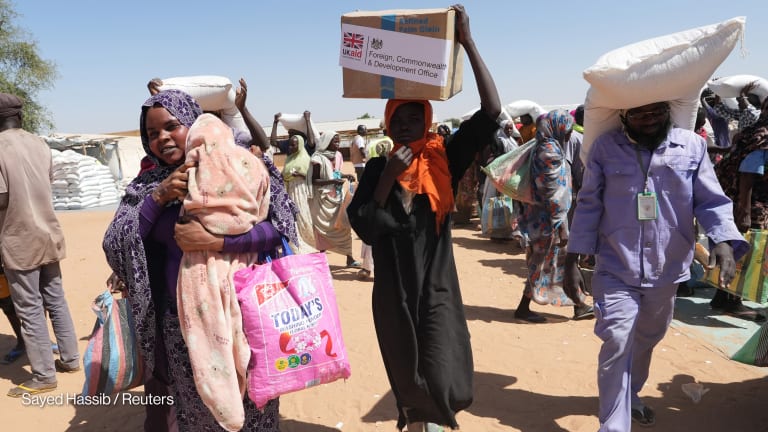Cuba's top aid donors: 'We have a commitment to the people'
Even as U.S. aid officials mull their options in Cuba, the country's long-standing foreign aid donors seem keen to step up their engagement with Havana — an apparent statement of confidence in President Raul Castro's market-driven economic reforms.
Several months after U.S. President Barack Obama announced plans to lift the United States’ 50-year-old trade embargo with Cuba, the U.S. Agency for International Development has given no indication as of yet that it intends to set up shop in the Caribbean country. Yet even as U.S. aid officials mull their options in Cuba, the country’s long-standing foreign aid donors seem keen to step up their engagement with Havana — an apparent statement of confidence in President Raul Castro's market-driven economic reforms. “We decided to be in Cuba because we have a commitment to the people there,” Francisco Quesada Benavente, adviser to the secretary-general for international development of the Spanish Ministry of Foreign Affairs and Cooperation told Devex. “As we have more economic resources, the idea is to increase our economic commitments to them.” Citing the thaw in U.S.-Cuba relations, Japanese Prime Minister Shinzo Abe revealed earlier this month that the Japanese government was also considering expanding its financial aid to Cuba. Meanwhile, at the urging of the European Commission, the European Union last year exempted Cuba from its aid differentiation policy, which would have effectively discontinued bilateral aid to Cuba because of the country’s upper middle-income status. EU and Cuban officials are currently negotiating a political dialogue and cooperation agreement which would pave the way for closer development cooperation between Havana and Brussels. “We definitely have a lot on which we can build and we believe that finalizing this agreement will be key to develop our political dialogue and our cooperation on more solid basis,” EU foreign affairs chief Federica Mogherini said during a visit to Cuba this week. While Cuba enjoys a relatively high level of human development — the country records the highest human development index in the Caribbean — Cuba’s foreign aid donors are making a push for Havana to liberalize its political system to foster growth. “Because it’s a dictatorship over there, we have to take care about what we do with our economic resources,” the Spanish foreign ministry’s Quesada stressed. Based on the latest available data from 2013, below, Devex ranks the top foreign aid donors to Cuba and examines their programs and priorities. In no small part due to objections from Washington, neither the World Bank nor the Inter-American Development Bank feature on this list. Spain In 2013, Spain disbursed $13.4 million in official development assistance to Cuba, up 73 percent from the year before. In its 2014-17 framework agreement for development cooperation with Cuba, the Spanish government anticipates that rural development and climate change could be allocated at least 85 percent of Spanish aid spending in Cuba over that period. Capitalizing upon the shared heritage between the two countries, the Spanish government also considers education and culture as priorities for its aid engagement with Cuba. EU institutions The European Union disbursed $12.9 million in ODA to Cuba in 2013, a 72 percent increase from 2012. In its current multiannual indicative program for Cuba, the EU allocates 50 million euros ($54.9 million) in assistance between 2014 and 2020. Over that period, the EU plans to direct 42 percent of its Cuba aid spending to food security and sustainable agriculture, followed by environment and climate change (36 percent) and sustainable economic and social modernization (20 percent). United States In 2013, the United States disbursed $10.5 million in ODA to Cuba, an 18 percent reduction from the previous year. U.S. aid commitments to Cuba reach roughly $20 million a year, the entirety of which is directed toward civil society initiatives that promote democracy and human rights. In April of last year, USAID’s ‘Cuban Twitter’ platform, which was reportedly designed to encourage dissent in the island country, came under intense scrutiny from Congress. U.S. aid officials seem reluctant to expand the scope of their engagement in Havana, likely in part due to reservations among members of Congress. Switzerland Switzerland disbursed $9.8 million in ODA to Cuba in 2013, a 50 percent jump from 2012. In 2013, Switzerland directed 31 percent of its ODA to Cuba to the agriculture sector, followed by environment protection (23 percent) and government and civil society (21 percent). Since 2011, municipal development, particularly in the areas of agriculture and housing, has been the principal focus of the Swiss Agency for Development and Cooperation’s engagement in the island country. The Global Fund to Fight AIDS, Tuberculosis and Malaria In 2013, the Global Fund to Fight AIDS, Tuberculosis and Malaria disbursed $9.3 million in ODA to Cuba, up 7 percent from the year before. Since it was founded in 2002, the Global Fund has approved $92.5 million in financing for Cuba, of which 92 percent has been channeled toward strengthening the national response to HIV and AIDS. According to the Global Fund, its financing for Cuba currently provides antiretroviral treatment for 8,100 people. OPEC Fund for International Development The development finance institution of the Organization of the Petroleum Exporting Countries, the OPEC Fund for International Development disbursed $7.3 million in ODA to Cuba in 2013, up 12 percent from 2012. In 2013, the energy sector claimed 58 percent of OFID’s ODA to the island country, while water supply and sanitation garnered 34 percent. OFID’s largest ongoing project in Havana is the $100 million Bayamo Water Supply System Modernization Project, which is co-financed by the Cuban government. Global Environment Facility One of the largest multilateral funders in the field of global environmental protection, the Global Environment Facility disbursed $5.7 million in ODA to Cuba in 2013, a jump of 27 percent from the year before. Under the sixth GEF (2014-2018), Cuba is slated to receive $16.1 million from the facility. Nearly three-quarters of that amount will be channeled toward biodiversity projects, well ahead of climate change (19 percent) and land degradation (7 percent). Japan Japan disbursed $5.7 million in ODA to Cuba in 2013, up 5 percent from 2012. In 2013, 36 percent of Japanese ODA was directed toward water supply and sanitation, followed by 28 percent for health. The Japan International Cooperation Agency is financing the four-year Project for Capacity Enhancement of Groundwater and Seawater Intrusion Management in Mayabeque and Artemisa provinces. JICA has also revealed plans to diversify its portfolio in Cuba. Canada In 2013, Canada disbursed $3.7 million in ODA to Cuba, down 8 percent from 2012. Government and civil society claimed the highest share (27 percent) of Canadian ODA to the island country in 2013, followed by education (21 percent). According to the Canadian government, increasing agricultural productivity and improving the efficient and accountable delivery of public services are the two overarching priorities for Canadian aid to Cuba. Norway Norway disbursed $3.6 million in ODA to Cuba in 2013, down 22 percent from 2012. Disaster prevention and preparedness accounted for 41 percent of Norwegian ODA to Cuba in 2013, ahead of government and civil society (34 percent) and fishing (18 percent). Through its Oil for Development Program, Norway also provides technical assistance to the Cuban government to support the development of the country’s emerging petroleum sector. Check out more funding trends analyses online, and subscribe to Money Matters to receive the latest contract award and shortlist announcements, and procurement and fundraising news.
Several months after U.S. President Barack Obama announced plans to lift the United States’ 50-year-old trade embargo with Cuba, the U.S. Agency for International Development has given no indication as of yet that it intends to set up shop in the Caribbean country.
Yet even as U.S. aid officials mull their options in Cuba, the country’s long-standing foreign aid donors seem keen to step up their engagement with Havana — an apparent statement of confidence in President Raul Castro's market-driven economic reforms.
“We decided to be in Cuba because we have a commitment to the people there,” Francisco Quesada Benavente, adviser to the secretary-general for international development of the Spanish Ministry of Foreign Affairs and Cooperation told Devex. “As we have more economic resources, the idea is to increase our economic commitments to them.”
This story is forDevex Promembers
Unlock this story now with a 15-day free trial of Devex Pro.
With a Devex Pro subscription you'll get access to deeper analysis and exclusive insights from our reporters and analysts.
Start my free trialRequest a group subscription Printing articles to share with others is a breach of our terms and conditions and copyright policy. Please use the sharing options on the left side of the article. Devex Pro members may share up to 10 articles per month using the Pro share tool ( ).
Lorenzo is a former contributing analyst for Devex. Previously Devex's senior analyst for development finance in Manila.








